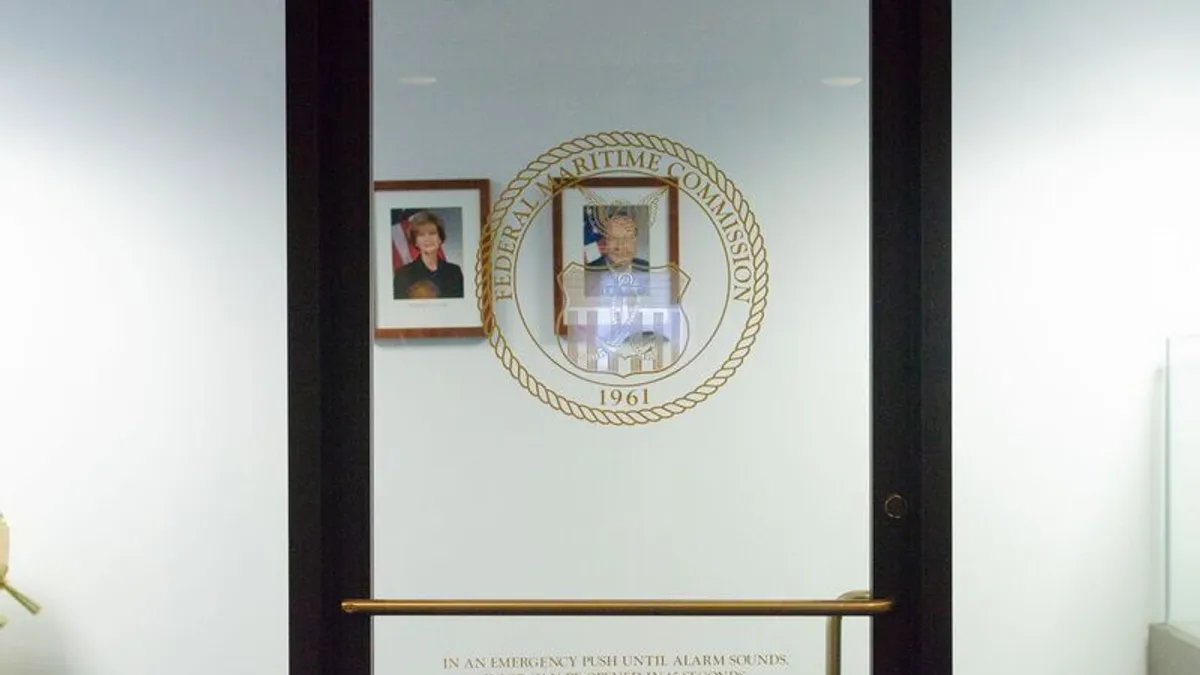Dive Brief:
- The Federal Maritime Commission will meet with the CEOs of six ocean carriers this week as part of the agency's investigation into carrier alliances, FMC Commissioner Rebecca Dye told Supply Chain Dive in an interview Monday.
- "I believe that they're very interested and making some major changes that will go a long way toward easing these problems of returning these containers in L.A./Long Beach and New York/New Jersey," Dye said, declining to name the carriers with which the agency is meeting.
- Dye plans to talk with carriers about the four suggested changes to operations the agency suggested in June following meetings with stakeholders in Southern California. "We're looking for decisions and next steps if necessary," Dye said of the meetings this week.
Dive Insight:
The FMC's meetings with the ocean carrier executives come a month after the agency announced plans to expand the scope of its fact-finding mission, which looks to identify solutions to supply chain challenges stemming from the pandemic. The expanded scope allowed Dye to investigate carriers operating in alliances that call the California ports of Long Beach and Los Angeles, or the Port of New York and New Jersey.
"Many people said that what we lack in our port performance groups ... is more carrier involvement," she said. "Very early on as part of this fact finding, I reached out to the CEOs of North America and asked them to use their influence to push forward solutions. And so, this is the next phase of that effort."
When asked about meeting with the FMC, Maersk and Hapag-Lloyd declined to comment. CMA CGM, COSCO and MSC did not return requests to comment.
The changes suggested by the FMC rely on the ocean carriers to provide more information to the other legs of the supply chain.
"Which terminal will we be receiving particular containers on a certain date?" she said as an example. "And the challenge is to make sure that that information is reliable and doesn't change at the last minute."
Some supply chain stakeholders have been eager to see the FMC use its regulatory power over ocean carriers. U.S. exporters are currently frustrated by their inability to get containers from the ocean carriers that are eager to ferry them across the Pacific for Asian exporters. West Coast truckers have said the alliance structure has complicated the process for dual transactions. Many are hopeful Dye's investigation will result in change.
"The FMC's recent announcement is the first time I think somebody has stood up and said these practices do not look fair and equitable," Weston LaBar, the CEO of the Harbor Trucking Association, told Supply Chain Dive this month. "I'm interested to see if the ocean carriers actually try to come to the table as a partner, or whether they continue to bury their head in the sand and act like we're all just here to service them."
Peter Friedmann, the executive director of the Agriculture Transportation Coalition, is similarly skeptical of the ocean carrier's willingness to make change, adding that carriers have not followed the agency's recently issued detention and demurrage guidance.
"I guess I don't blame them," Friedmann said, referring to the ocean carriers. "They're used to the FMC not doing anything other than doing a study or report. They ignored those [detention and demurrage] guidelines."
Dye pushed back on the idea that ocean carriers aren't following the guidelines issued by the agency.
"To fully implement the demurrage and detention rule, terminals have to change their [information technology] systems," Dye said. "And we knew that. And we still advocate for their making those changes. But in the meantime, we expect them to either not charge ... under the conditions outlined in the rule, or refund the money promptly.
"We hear a lot of complaints about that," she said, "that carriers are refunding the money, but it takes a long time."
She said members of the public who have reports of carriers not following the detention and demurrage guidelines should contact the FMC at the email address it set up for the fact-finding mission to receive public comments.
Ensuring that carriers abide by the suggested changes for container returns and blank sailings is a detail the agency has not yet finalized, Dye said.
"We really haven't discussed that," she said, when asked how the agency would enforce the suggestions. "To tell the truth, I don't expect if we get an agreement from this group that they will do anything but move forward with the changes. But I have not contemplated any sort of rule or anything like that yet."
The U.S. is not the only country with a regulatory body that has called for a meeting with ocean carrier executives this year. The Chinese government reportedly met with ocean carriers this year to discuss rates and capacity. Dye said she's heard of this meeting but doesn't plan to discuss it with the ocean carriers.














